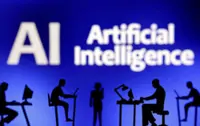As AI evolves into a technology that encroaches deeper into daily life, some Silicon Valley workers aren’t embracing it with the same level of trust that they’ve shown with other advances. Huang and his peers are likely to keep facing calls from workers who feel they need to be heard. — AP
Masheika Allgood and Alexander Tsado left their 2020 meeting with Nvidia Corp chief executive officer Jensen Huang feeling frustrated.
The pair, both former presidents of the company’s Black employees group, had spent a year working with colleagues from across the company on a presentation meant to warn Huang of the potential dangers that artificial intelligence technology posed, especially to minorities.
The 22-slide deck and other documents, reviewed by Bloomberg News, pointed to Nvidia’s growing role in shaping the future of AI – saying its chips were making AI ubiquitous – and warned that increased regulatory scrutiny was inevitable. The discussion included instances of bias in facial-recognition technologies used by the industry to power self-driving cars. Their aim, the pair told Bloomberg, was to find a way to confront the potentially perilous unintended consequences of AI head-on – ramifications that would likely be first felt by marginalised communities.
According to Allgood and Tsado, Huang did most of the talking during the meeting. They didn’t feel he really listened to them and, more importantly, didn’t get a sense that Nvidia would prioritise work on addressing potential bias in AI technology that could put underrepresented groups at risk.
Tsado, who was working as a product marketing manager, told Bloomberg News that he wanted Huang to understand that the issue needed to be tackled immediately – that the CEO might have the luxury of waiting, but “I am a member of the underserved communities, and so there’s nothing more important to me than this. We’re building these tools and I’m looking at them and I’m thinking, this is not going to work for me because I’m Black”.
Both Allgood and Tsado quit the company shortly afterwards. Allgood’s decision to leave her role as a software product manager, she said, was because Nvidia “wasn’t willing to lead in an area that was very important to me”. In a LinkedIn post, she called the meeting “the single most devastating 45 minutes of my professional life”.
While Allgood and Tsado have departed, the concerns they raised about making AI safe and inclusive still hang over the company, and the AI industry at large. The chipmaker has one of the poorest records among big tech companies when it comes to Black and Hispanic representation in its workforce, and one of its generative AI products came under criticism for its failure to account for people of colour.
The matters raised by Allgood and Tsado, meantime, also have resonated. Though Nvidia declined to comment on the specifics of the meeting, the company said it “continues to devote tremendous resources to ensuring that AI benefits everyone”.
“Achieving safe and trustworthy AI is a goal we’re working towards with the community,” Nvidia said in a statement. “That will be a long journey involving many discussions.”
One topic of the meeting isn’t in dispute. Nvidia has become absolutely central to the explosion in deployment of artificial intelligence systems. Sales of its chips, computers and associated software have taken off, sending its shares on an unprecedented rally. It’s now the world’s only chipmaker with a trillion-dollar market value.
What was once a niche form of computing is making its way into everyday life in the form of advanced chatbots, self-driving cars and image recognition. And AI models – which analyse existing troves of data to make predictions aimed at replicating human intelligence – are under development to be used in everything from drug discovery and industrial design to the advertising, military and security industries. With that proliferation, the concern about the risks it poses has only grown. Models are usually trained on massive datasets created by gathering information and visuals from across the internet.
As AI evolves into a technology that encroaches deeper into daily life, some Silicon Valley workers aren’t embracing it with the same level of trust that they’ve shown with other advances. Huang and his peers are likely to keep facing calls from workers who feel they need to be heard.
And while Silicon Valley figures such as Elon Musk have expressed fears about AI’s potential threat to human existence, some underrepresented minorities say they have a far more immediate set of problems. Without being involved in the creation of the software and services, they worry that self-driving cars might not stop for them, or that security cameras will misidentify them.
"The whole point of bringing diversity into the workplace is that we are supposed to bring our voices and help companies build tools that are better suited for all communities,’’ said Allgood. During the meeting, Allgood said she raised concerns that biased facial-recognition technologies used to power self-driving cars could pose greater threats to minorities. Huang replied that the company would limit risk by testing vehicles on the highway, rather than city streets, she said.
The lack of diversity and its potential impact is particularly relevant at Nvidia. Only one out of a sample of 88 S&P 100 companies ranked lower than Nvidia based on their percentages of Black and Hispanic employees in 2021, according to data compiled by Bloomberg from the US Equal Employment Opportunity Commission. Of the five lowest-ranked companies for Black employees, four are chipmakers: Advanced Micro Devices Inc, Broadcom Inc, Qualcomm Inc and Nvidia. Even by tech standards – the industry has long been criticized for its lack of diversity – the numbers are low.
During the meeting, Allgood recalled Huang saying that the diversity of the company would ensure that its AI products were ethical. At that time, only 1% of Nvidia employees were Black – a number that hadn’t changed from 2016 until then, according to data compiled by Bloomberg. That compared with 5% at both Intel Corp and Microsoft Corp, 4% at Meta Platforms Inc and 14% for the Black share of the US population overall in 2020, the data showed. People with knowledge of the meeting who asked not to be identified discussing its contents said Huang meant diversity of thought, rather than specifically race.
According to Nvidia, a lot has happened since Allgood and Tsado met with the CEO. The company says it has done substantial work to make its AI-related products fair and safe for everyone. AI models that it supplies to customers come with warning labels, and it vets the underlying datasets to remove bias. It also seeks to ensure that AI, once deployed, remains focused on its intended purpose.
In emails dated March 2020 reviewed by Bloomberg, Huang did give the go-ahead for work to start on some of Allgood’s proposals, but by that time she’d already handed in her notice.
Not long after Allgood and Tsado left Nvidia, the chipmaker hired Nikki Pope to lead its in-house Trustworthy AI project. Co-author of a book on wrongful convictions and incarcerations, Pope is head of what’s now called Nvidia’s AI & Legal Ethics programme.
Rivals Alphabet Inc’s Google and Microsoft had already set up similar AI ethics teams a few years earlier. Google publicly announced its “AI principles” in 2018 and has given updates on its progress. Microsoft had a team of 30 engineers, researchers and philosophers on its AI ethics team in 2020, some of whom it laid off this year.
Pope, who’s Black, said she doesn’t accept the assertion that minorities have to be involved directly to be able to produce unbiased models. Nvidia examines datasets that software is trained on, she said, and makes sure that they’re inclusive enough.
“I’m comfortable that the models that we provide for our customers to use and modify have been tested, that the groups who are going to be interacting with those models have been represented,” Pope said in an interview.
The company has created an open-source platform, called NeMo Guardrails, to help chatbots filter out unwanted content and stay on topic. Nvidia now releases “model cards” with its AI models, which provide more details on what a model does and how it’s made, as well as its intended use and limitations.
Nvidia also collaborates with internal affinity groups to diversify its datasets and test the models for biases before release. Pope said datasets for self-driving cars are now trained on images that include parents with strollers, people in wheelchairs and darker-skinned people.
Pope and colleague Liz Archibald, who is director of corporate communications at Nvidia and also Black, said that they once had a “tough meeting” with Huang over AI transparency and safety. But they felt like his questions brought more rigor to their work.
“I think his end goal was to pressure-test our arguments and probe the logic to help figure out how he could make it even better for the company as a whole,” Archibald said in an email.
Some researchers say that minorities are so underrepresented in tech, and particularly in AI, that without their input, algorithms are likely to have blind spots. A paper from New York University’s AI Now Institute has linked a lack of representation in the AI workforce to bias in models, calling it a “diversity disaster”.
In 2020, researchers from Duke University set out to create software that would convert blurry pictures into high-resolution images, using a large language model from Nvidia called StyleGAN, which was developed to produce fake but hyperreal-looking human faces and trained on a dataset of images from photo site Flickr.
When users played around with the tool, they found it struggled with low-resolution photos of people of colour – including former US President Barack Obama and Congresswoman Alexandria Ocasio-Cortez – inadvertently generating images of faces with lighter skin tones and eye colours. The researchers later said the bias likely came out of Nvidia’s model and updated their software.
Nvidia mentions in its code archives that its version of the dataset was collected from Flickr and inherits “all the biases of that website.” In 2022, it added that the dataset should not be used for “development or improvement of facial recognition technologies”.
The model that was criticised has been superseded by a new one, according to Pope.
Nvidia joins a list of large companies where some minority employees have expressed concern that the new technology carries dangers, particularly for people of colour. Timnit Gebru, an AI ethics researcher, left Google after the company wanted her to retract her paper that warned of the dangers of training AI models (Gebru said Google fired her; the company said she resigned). She has said that any methodology that uses datasets “too large to document were inherently risky,” as reported by the MIT Technology Review.
Gebru and Joy Buolamwini, founder of the Algorithmic Justice League, published a paper called “Gender Shades” that showed how facial recognition technologies make errors at higher rates when identifying women and people of colour. A growing number of studies now support their research that underlying datasets used to power AI models are biased and are capable of harming minorities. International Business Machines Corp, Microsoft and Amazon.com Inc have stopped selling facial recognition technologies to police departments.
“If you look within the history of the tech industry, it’s not a beacon for being reflective of serious commitment to diversity,” said Sarah Myers West, the managing director of AI Now Institute and a co-author of the paper on lack of diversity in the AI workforce. The industry has a long history of not taking minorities and their concerns seriously, she said.
Nvidia’s head of human resources, Shelly Cerio, told Bloomberg that while the company was functioning like a startup – and worrying about surviving – it hired primarily to meet its immediate skills needs: as many engineers with higher degrees as it could find. Now that it’s larger, Nvidia has made diversity in its recruitment more of a priority.
“Have we made progress? Yes,” she said. “Have we made enough progress? Absolutely not.”
The company improved its hiring of Black employees after 2020. Black representation grew from 1.1% in 2020 to 2.5% in 2021, the most recent year that data is available. Asians are the largest ethnic group at the company, followed by White employees.
Pope said all of the company’s efforts don’t “guarantee or eliminate” bias, but do provide a diversified dataset that can help address them. She said that in a fast-paced company that has released hundreds of models, scaling up her processes to address safety is one of the challenges of her role.
It also will take years to tell whether this work will be enough to keep AI systems safe in the real world. Self-driving cars, for example, are still rare.
A few weeks before Allgood left the company, she wrote one last email to Huang reflecting on when she had worked as a teacher in her previous career. She wrote that when she took her students on field trips, she relied on parents and volunteers to help her manage them – an acknowledgement that no one, no matter how brilliant, could handle a group of kids in the wild.
“AI has permanently moved into the field trip stage,” read the email. “You need colleagues and a structure to manage the chaos.” – Bloomberg





